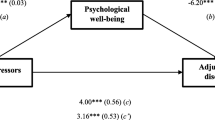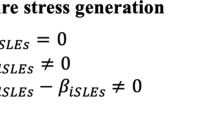Abstract
Background
Stressful life events are associated with depression and their role in first onset and recurrences is a promising but controversial perspective of research. The objective is to analyze the role of number of previous episodes and life events exposure in a large sample of primary care depressive patients taking into account life events severity.
Method
10,257 patients with DSM-IV criteria for a current single or recurrent major depressive episode were recruited by 2,056 general practitioners in a cross-sectional epidemiological study. Patients answered the Montgomery-Asberg Depression Rating Scale, the Patient Health Questionnaire and the Social Readjustment Rating Scale (SRRS). Stressful life events were categorized into three levels of severity (severe, moderate and mild). All relevant confounding variables were analyzed: age, gender, depression severity, somatic symptoms severity and length of episode.
Results
We found a significant positive correlation with number of episodes and depression severity. There was no significant correlation of SRRS scores with age, gender and length of episode. ANOVA exploring life events severity with regard to number of episodes showed statistically differences in SRRS total score, moderate life events and mild life events (F = 15.14, p < 0.001) but not for severe life events.
Conclusions
Prevention and treatment strategies for recurrent depression need to manage life stressful events during mild and long-term periods and not just in the initial recurrences of the disease.
Similar content being viewed by others
References
Kessler RC, Berglund P, Demler O et al (2003) The epidemiology of major depressive disorder: results from the National Comorbidity Survey Replication (NCS-R). JAMA 289:3095–3105
Solomon DA, Leon AC, Endicott J et al (2004) Psychosocial impairment and recurrence of major depression. Compr Psychiatry 45:423–430
Yiend J, Paykel E, Merrit R et al (2009) Long term outcome of primary care depression. J Affect Disord 118:79–86
Gili M, Garcia-Toro M, Vives M et al (2011) Medical comorbidity in recurrent versus first-episode depressive patients. Acta Psychiatr Scand 123:220–227
Burcusa SL, Iacono WG (2007) Risk for recurrence in depression. Clin Psychol Rev 27:959–985
Muscatell KA, Slavich GM, Monroe SM, Gotlib IH (2009) Stressful life events, chronic difficulties, and the symptoms of clinical depression. J Nerv Ment Dis 197:154–160
Hammen C (2005) Stress and depression. Annu Rev Clin Psychol 1:293–319
Paykel ES (2003) Life events and affective disorders. Acta Psychiatr Scand (Suppl 418):61–66
Siegrist J (2008) Chronic psychosocial stress at work and risk of depression: evidence from prospective studies. Eur Arch Psychiatry Clin Neurosci 258:115–119
Monroe SM, Harkness KL (2005) Life stress, the “kindling” hypothesis, and the recurrence of depression: considerations from a life stress perspective. Psychol Rev 112:417–445
Stroud CB, Davila J, Moyer A (2008) The relationship between stress and depression in first onsets versus recurrences: a meta-analytic review. J Abnorm Psychol 117:206–213
Post RM, Susan R, Weiss B (1992) Sensitization, kindling, and carbamazepine: an update on their implications for the course of affective illness. Pharmacopsychiatry 25:41–43
Hammen C (1991) Generation of stress in the course of unipolar depression. J Abnorm Psychol 100:555–561
Johnson DP, Whisman MA, Corley RP et al (2012) Association between depressive symptoms and negative dependent life events from late childhood to adolescence. J Abnorm Child Psychol. doi:10.1007/s10802-012-9642-7
Monroe SM, Torres LD, Guillaumot J et al (2006) Life stress and the long-term treatment course of recurrent depression: III. Nonsevere life events predict recurrence for medicated patients over 3 years. J Consult Clin Psychol 74:112–120
Ormel J, Oldehinkel AJ, Brilman EI (2001) The interplay and etiological continuity of neuroticism, difficulties, and life events in the etiology of major and subsyndromal, first and recurrent depressive episodes in later life. Am J Psychiatry 158:885–891
You S, Conner KR (2009) Stressful life events and depressive symptoms: influences of gender, event severity, and depression history. J Nerv Ment Dis 197:829–833
Roca M, Armengol S, Garcia-Garcia M et al (2011) Clinical differences between first and recurrent episodes in depressive patients. Compr Psychiatry 52:26–32
American Psychiatric Association (1994) Diagnostic and statistical manual of mental disorders, 4th ed. DSM-IV. American Psychiatric Press, Washington
Montgomery SA, Asberg M (1979) A new depression scale designed to be sensitive to change. Br J Psychiatry 134:382–389
Kroenke K, Spitzer RL, Williams JB (2002) The PHQ-15: validity of a new measure for evaluating the severity of somatic symptoms. Psychosom Med 64:258–266
Holmes TH, Rahe RH (1967) The Social Readjustment Rating Scale. J Psychosom Res 11:213–218
Hill T, Lewicki P (2006) Statistics: methods and applications. A comprehensive reference for science, industry, and data mining. StaftSoft, Tulsa
Post RM, Weiss SR (1998) Sensitization and kindling phenomena in mood, anxiety, and obsessive-compulsive disorders: the role of serotonergic mechanisms in illness progression. Biol Psychiatry 44:193–206
Corruble E (2006) Recurrent depression and life events: ACTUEL survey. Encephale 32:983–987
Olsen LR, Mortensen EL, Bech P (2004) Prevalence of major depression and stress indicators in the Danish general population. Acta Psychiatr Scand 109:96–103
Lewinsohn PM, Rohde P, Klein DN, Seeley JR (1999) Natural course of adolescent major depressive disorder: I. Continuity into young adulthood. J Am Acad Child Adolesc Psychiatry 38:56–63
Paykel ES, Tanner J (1976) Life events, depressive relapse and maintenance treatment. Psychol Med 6:481–485
Gonzales LR, Lewinsohn PM, Clarke GN (1985) Longitudinal follow-up of unipolar depressives: an investigation of predictors of relapse. J Consult Clin Psychol 53:461–469
Lewinsohn PM, Hoberman HM, Rosenbaum M (1988) A prospective study of risk factors for unipolar depression. J Abnorm Psychol 97:251–264
Monroe SM, Roberts JE, Kupfer DJ, Frank E (1996) Life stress and treatment course of recurrent depression: II. Postrecovery associations with attrition, symptom course, and recurrence over 3 years. J Abnorm Psychol 105:313–328
Patten SB (2012) Childhood and adult stressors and major depression risk: interpreting interactions with the sufficient-component cause model. Soc Psychiatry Psychiatr Epidemiol. doi:10.1007/s00127-012-0603-9
Mitchell PB, Parker GB, Gladstone GL et al (2003) Severity of stressful life events in first and subsequent episodes of depression: the relevance of depressive subtype. J Affect Disord 73:245–252
Parker G, Fletcher K, Barrett M et al (2010) Inching toward Bethlehem: mapping melancholia. J Affect Disord 123:291–298
Gollan JK, Pane HT, Mccloskey MS, Coccaro EF (2008) Identifying differences in biased affective information processing in major depression. Psychiatry Res 159:18–24
Falkai P, Möller HJ (2012) Psychopathology: genetics and the stress-vulnerability hypothesis. Eur Arch Psychiatry Clin Neurosci 262:181–182
Mitjans M, Arias B (2012) The genetics of depression: what information can new methodologic approaches provide? Actas Esp Psiquiatr 40:70–83
Liu RT (2010) Stress generation in depression: a systematic review of the empirical literature and recommendations for future study. Clin Psychol Rev 30:582–593
Friedman MJ, Resick PA, Bryant RA et al (2011) Classification of trauma and stressor-related disorders in DSM-5. Depress Anxiety 28:737–749
Caldieraro MAK, Baeza FLC, Pinheiro DO et al (2012) Clinical differences between melancholic and non-melancholic depression as defined by the CORE system. Compr Psychiatry. doi:10.1016/j.comppsych.2012.05.012
Acknowledgments
We thank all the Spanish general practitioners who participated in data collection.
Author information
Authors and Affiliations
Corresponding author
Rights and permissions
About this article
Cite this article
Roca, M., Gili, M., Garcia-Campayo, J. et al. Stressful life events severity in patients with first and recurrent depressive episodes. Soc Psychiatry Psychiatr Epidemiol 48, 1963–1969 (2013). https://doi.org/10.1007/s00127-013-0691-1
Received:
Accepted:
Published:
Issue Date:
DOI: https://doi.org/10.1007/s00127-013-0691-1




